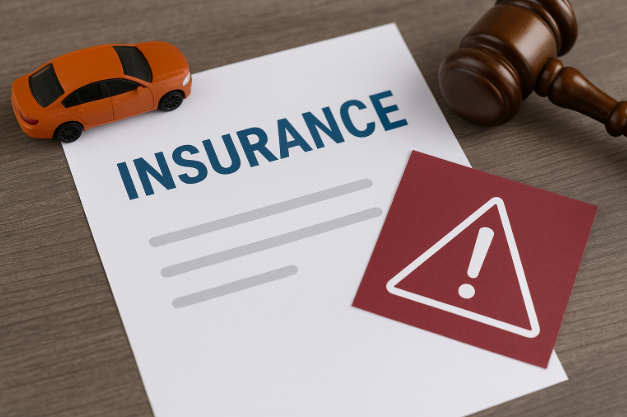Hello Everyone! Adding business use to your car insurance UK policy can affect premiums, cover options, and risk. In this article, we’ll address your important queries in this article, Such as:
- What is business use insurance?
- How much does it cost?
- How to reduce your premium?
This article breaks down what qualifies as business use, how insurers categorize it, and—most importantly—what it will cost you. You’ll also learn how insurers calculate your premiums, how to avoid unnecessary costs, and what to do if others drive your vehicle for work purposes.
What Is “Business Use” on Car Insurance in the UK?
What counts as business use?
When it comes to car insurance, “business use” means using your vehicle for purposes other than commuting.
- Visiting clients or work sites
- Attending conferences or training sessions
- Making deliveries or transporting equipment
- Running errands on behalf of your employer
This type of usage goes beyond just traveling to a fixed place of work and includes any driving done to complete work tasks.
How does business use differ from personal or social cover?
There are three main types of car insurance use:
- Social, Domestic, and Pleasure (SDP): Covers leisure activities and everyday driving, excluding commuting.
- Social and Commuting: Includes commuting by car to and from a single, regular workplace.
- Business Use: Encompasses all work-related driving not included above.
“Business use insurance bridges the gap between personal and work driving,” says insurance expert Jane Smith from London Insurance Watch. “”Your policy may be nullified during a claim if you fail to declare it.”
How Much Does It Cost to Add Business Use to Car Insurance UK?

What is the typical price increase?
The cost varies depending on several factors, but you can generally expect:
- £50 to £150 per year for occasional business travel
- £150 to £300+ for regular, high-mileage work travel
Some insurance providers charge a small admin fee (£10-£25) to update your policy mid-term. The actual increase also depends on the type of business use required (Class 1, 2, or 3).
Which factors affect the cost?
Several risk-related factors influence the additional premium:
- Annual Mileage: Higher mileage often means higher premiums.
- Job Role: Sales reps may pay more than office managers due to frequent travel.
- Driving History: Costs may be reduced with a spotless driving record.
- Vehicle Type: Expensive or modified cars may carry higher premiums.
- Location: Prices are frequently higher in urban locations with greater rates of theft or accidents.
- Previous Claims: Based on prior claims, insurers may raise premiums.
Table: Rough Premium Increase Examples
| Driver Profile | Annual Mileage | Premium Increase |
|---|---|---|
| Self-employed consultant | 5,000 miles | £70 |
| Sales rep visiting sites | 15,000 miles | £180 |
| Delivery driver (van use) | 30,000+ miles | £300+ |
| Type | Typical Annual Cost | Equivalent Monthly Cost |
|---|---|---|
| Class 1 (standard business use) | ~£573 (Confused.com Q1 2025) | ~£48 |
| Average business policy (Confused.com) | ~£627 | ~£52 |
| Class 3 (commercial travelling, door-to-door sales) | ~£1,263 | ~£105 |
How Do Insurers Define Business Use?

What wording should you look for in the policy?
Insurers use different terms to define business-related driving:
- Commuting: Traveling to one regular place of work
- Business Use Class 1: Occasional travel to different sites (non-commercial use)
- Business Use Class 2: Business use by policyholder and named drivers
- Class 3: High-mileage commercial use, such as door-to-door sales
Always read the fine print and call your insurer if anything is unclear.
Can small errands count as business use?
Yes, even simple errands such as picking up supplies or dropping off documents can fall under business use. If you drive during work hours or for any company-related task, it’s best to disclose that:
- Failure to do so can result in claim denials
- Misrepresentation might lead to policy cancellation
According to insurance advisor Tom Lewis, “Failing to declare business use can invalidate your cover.”
How Can You Reduce the Cost of Business Use Cover?
What strategies lower your premium?
To keep business use insurance affordable:
- Use telematics: Devices track safe driving, often cutting premiums
- Limit business mileage: Based on prior claims, insurers may raise premiums.
- Install security features: Dash cams, alarms, and trackers reduce risk
- Choose economical vehicles: Cars in lower insurance classes are less expensive.
- Bundle policies: Use the same provider for personal, home, or business insurance
Does increasing the voluntary excess help?
Yes. You demonstrate your willingness to share risk with the insurer by raising your voluntary excess. This is able to:
- Lower your monthly or annual premium
- Save money if you don’t often make claims.
But make sure you have the extra cash on hand in case of an accident.
How to Choose the Best Business Use Insurance Policy
Which insurers offer best value?
Some UK insurers are known for competitive business-use coverage:
- Direct Line: Customisable business options
- Aviva: Competitive for professionals with low claims
- Admiral: Offers multi-car discounts
- NFU Mutual: Self-employed and rural drivers trust NFU Mutual.
Always compare at least 3-5 providers using tools like:
- Compare the Market
- MoneySuperMarket
- GoCompare
Should you use a broker or go direct?
Using a broker:
- Ideal for complex or specialist needs
- Access to exclusive deals and advice
Going direct:
- Can be faster and sometimes cheaper
- Suitable for standard or simple coverage needs
What Happens If You Don’t Declare Business Use?

Could your insurance be invalidated?
Absolutely. Undeclared business use is considered misrepresentation. Consequences include:
- Claim denial for accidents
- Rejection of theft or damage reports
- Legal action for fraudulent disclosure
What are practical consequences?
Not disclosing commercial usage may result in:
- Policy cancellation: Red flag in future applications
- Increased premiums: Labeled high-risk in databases
- Out-of-pocket costs: Paying for repairs or compensation personally
Insurers also share data through databases like CUE (Claims and Underwriting Exchange), which can affect all future quotes.
What Types of Business Use Cover Are Available?

There are various classes of business use:
Class 1 Business Use – The Basics for Work Travel
This is the most common type for people who drive to different work sites or meetings – think sales reps, consultants, or visiting clients.
-
What it covers: Travel to various locations for your job, beyond your usual commute.
-
What it doesn’t cover: Carrying goods or passengers for payment, or letting others drive for business.
-
Good for: Office workers who occasionally visit clients, NHS staff doing home visits, or site inspectors.
Class 2 Business Use – Add a Co-Worker or Assistant
Same as Class 1, but with a bonus – it lets you name an additional driver who also uses the car for work.
-
What it covers: All of Class 1, plus another named driver on the same business trips.
-
What it doesn’t cover: Still no deliveries, or using the car as part of a taxi or courier service.
-
Good for: Small business owners or colleagues who share the car for job-related travel.
Class 3 – For the Hustlers on the Road
This is for people who do a lot of driving for business – especially if you’re selling door-to-door or covering large areas.
-
What it covers: All of Class 1 and 2, plus long-distance travel and visiting lots of customers.
-
What it doesn’t cover: Deliveries, transporting goods, or giving rides for money.
-
Good for: Direct sales reps, self-employed consultants, or charity workers constantly on the move.
Commercial Use – Goods, Deliveries, and Passenger Transport
This one’s for full-time driving jobs where your vehicle is part of the service you offer.
-
What it covers: Delivering goods, courier services, food delivery, transporting paying passengers (like taxi or Uber work).
-
What it doesn’t cover: Non-commercial business travel – it’s strictly for those whose business is on the road.
-
Good for: Delivery drivers, tradespeople, taxi drivers, or anyone using their car or van as a money-making tool.
✅ Why Choosing the Right Class Matters
If you choose the incorrect kind, you may:
-
Overpay for cover you don’t need
-
Or worse, invalidate your insurance when making a claim
Temporary Business Car Insurance – Short-Term, Flexible Cover
This is perfect when you only need business use cover for a few days or weeks, not the whole year.
-
What it covers: Business-related driving such as visiting clients, attending meetings, or making occasional work trips.
-
Duration: Usually from 1 day up to 28 or 30 days, depending on the provider.
-
What it doesn’t cover: Regular business use over long periods, or commercial delivery work (unless specified).
-
Good for: Freelancers, contractors, or employees using a personal car temporarily for work purposes
Conclusion
How Much Does It Cost to Add Business Use to Car Insurance UK? Adding business use to a car insurance policy in the UK typically costs £50–£300+ per year, depending on mileage, job type, and personal factors. Always define your journey types, compare quotes, and consider telematics to manage costs.
By preparing the right information and using expert tips, you can balance proper cover with affordable premiums. Avoid risk by declaring business use honestly, and review your policy each year to stay protected and up to date.
FAQs about Business Use Car Insurance
1. Can I use my personal policy for occasional business trips?
You must always include business use if you drive for work—even occasionally—to stay covered.
2. Does telematics insurance work for business journeys?
Yes. A “black box” tracks driving habits for both personal and business miles, often reducing premiums.
3. Will adding business use affect my no‑claims bonus?
No. Business use doesn’t impact your NCD, but a claim will, business‑related or not.
4. How often should I review my business use needs?
At least annually, especially if mileage changes or job role evolves.
5. Can business use cover multiple drivers?
Yes, if specified in the policy. For commercial use, named drivers must also be declared.

I’m Joe Chris, co-author at ukbusinessmag.co.uk and a long-time enthusiast of all things business and finance. My background is in digital marketing and e-commerce, and I love diving into trends that impact the UK business landscape. Through my writing, I aim to make useful, real-world advice accessible to business owners.



